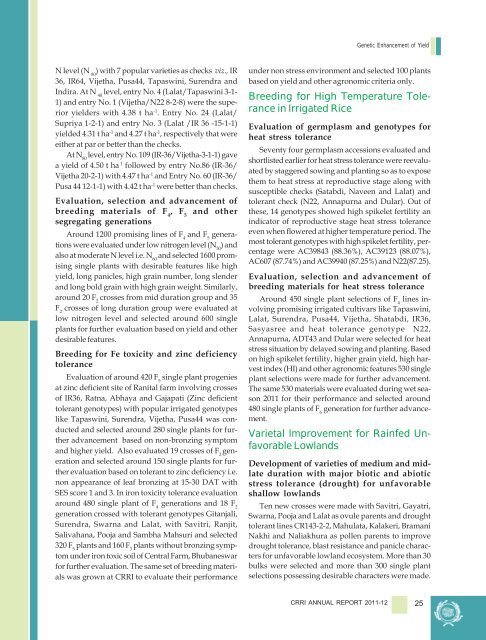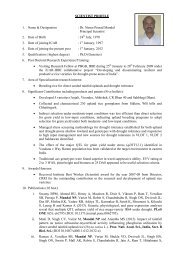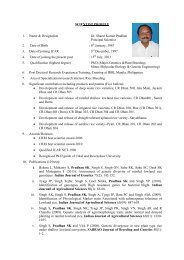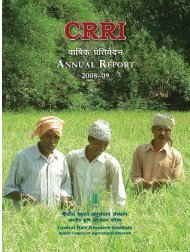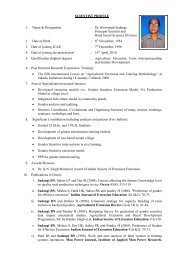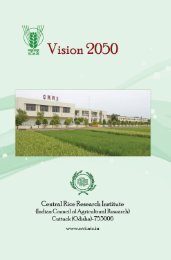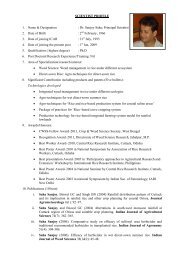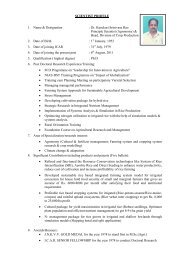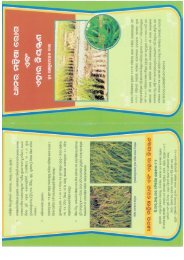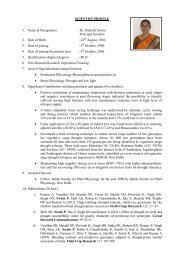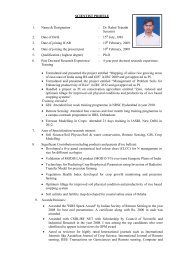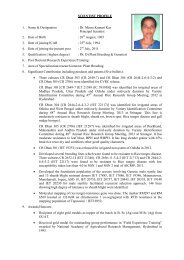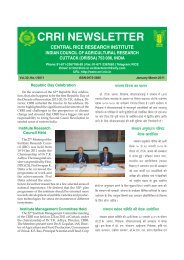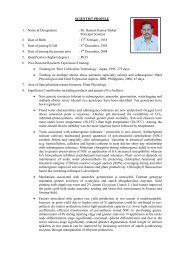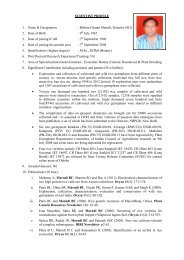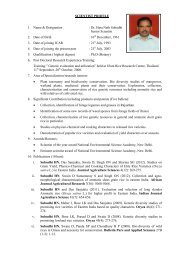Central Rice Research Institute Annual report...2011-12
Central Rice Research Institute Annual report...2011-12
Central Rice Research Institute Annual report...2011-12
Create successful ePaper yourself
Turn your PDF publications into a flip-book with our unique Google optimized e-Paper software.
Genetic Enhancement of Yield<br />
N level (N 80<br />
) with 7 popular varieties as checks viz., IR<br />
36, IR64, Vijetha, Pusa44, Tapaswini, Surendra and<br />
Indira. At N 40<br />
level, entry No. 4 (Lalat/Tapaswini 3-1-<br />
1) and entry No. 1 (Vijetha/N22 8-2-8) were the superior<br />
yielders with 4.38 t ha -1 . Entry No. 24 (Lalat/<br />
Supriya 1-2-1) and entry No. 3 (Lalat /IR 36 -15-1-1)<br />
yielded 4.31 t ha -1 and 4.27 t ha -1 , respectively that were<br />
either at par or better than the checks.<br />
At N 80<br />
level, entry No. 109 (IR-36/Vijetha-3-1-1) gave<br />
a yield of 4.50 t ha 1 followed by entry No.86 (IR-36/<br />
Vijetha 20-2-1) with 4.47 t ha -1 and Entry No. 60 (IR-36/<br />
Pusa 44 <strong>12</strong>-1-1) with 4.42 t ha -1 were better than checks.<br />
Evaluation, selection and advancement of<br />
breeding materials of F 4<br />
, F 5<br />
and other<br />
segregating generations<br />
Around <strong>12</strong>00 promising lines of F 4<br />
and F 5<br />
generations<br />
were evaluated under low nitrogen level (N 30<br />
) and<br />
also at moderate N level i.e. N 60<br />
and selected 1600 promising<br />
single plants with desirable features like high<br />
yield, long panicles, high grain number, long slender<br />
and long bold grain with high grain weight. Similarly,<br />
around 20 F 2<br />
crosses from mid duration group and 35<br />
F 2<br />
crosses of long duration group were evaluated at<br />
low nitrogen level and selected around 600 single<br />
plants for further evaluation based on yield and other<br />
desirable features.<br />
Breeding for Fe toxicity and zinc deficiency<br />
tolerance<br />
Evaluation of around 420 F 5<br />
single plant progenies<br />
at zinc deficient site of Ranital farm involving crosses<br />
of IR36, Ratna, Abhaya and Gajapati (Zinc deficient<br />
tolerant genotypes) with popular irrigated genotypes<br />
like Tapaswini, Surendra, Vijetha, Pusa44 was conducted<br />
and selected around 280 single plants for further<br />
advancement based on non-bronzing symptom<br />
and higher yield. Also evaluated 19 crosses of F 2<br />
generation<br />
and selected around 150 single plants for further<br />
evaluation based on tolerant to zinc deficiency i.e.<br />
non appearance of leaf bronzing at 15-30 DAT with<br />
SES score 1 and 3. In iron toxicity tolerance evaluation<br />
around 480 single plant of F 4<br />
generations and 18 F 2<br />
generation crossed with tolerant genotypes Gitanjali,<br />
Surendra, Swarna and Lalat, with Savitri, Ranjit,<br />
Salivahana, Pooja and Sambha Mahsuri and selected<br />
320 F 5<br />
plants and 160 F 3<br />
plants without bronzing symptom<br />
under iron toxic soil of <strong>Central</strong> Farm, Bhubaneswar<br />
for further evaluation. The same set of breeding materials<br />
was grown at CRRI to evaluate their performance<br />
under non stress environment and selected 100 plants<br />
based on yield and other agronomic criteria only.<br />
Breeding for High Temperature Tolerance<br />
in Irrigated <strong>Rice</strong><br />
Evaluation of germplasm and genotypes for<br />
heat stress tolerance<br />
Seventy four germplasm accessions evaluated and<br />
shortlisted earlier for heat stress tolerance were reevaluated<br />
by staggered sowing and planting so as to expose<br />
them to heat stress at reproductive stage along with<br />
susceptible checks (Satabdi, Naveen and Lalat) and<br />
tolerant check (N22, Annapurna and Dular). Out of<br />
these, 14 genotypes showed high spikelet fertility an<br />
indicator of reproductive stage heat stress tolerance<br />
even when flowered at higher temperature period. The<br />
most tolerant genotypes with high spikelet fertility, percentage<br />
were AC39843 (88.36%), AC39<strong>12</strong>3 (88.07%),<br />
AC607 (87.74%) and AC39940 (87.25%) and N22(87.25).<br />
Evaluation, selection and advancement of<br />
breeding materials for heat stress tolerance<br />
Around 450 single plant selections of F 4<br />
lines involving<br />
promising irrigated cultivars like Tapaswini,<br />
Lalat, Surendra, Pusa44, Vijetha, Shatabdi, IR36,<br />
Sasyasree and heat tolerance genotype N22,<br />
Annapurna, ADT43 and Dular were selected for heat<br />
stress situation by delayed sowing and planting. Based<br />
on high spikelet fertility, higher grain yield, high harvest<br />
index (HI) and other agronomic features 530 single<br />
plant selections were made for further advancement.<br />
The same 530 materials were evaluated during wet season<br />
2011 for their performance and selected around<br />
480 single plants of F 6<br />
generation for further advancement.<br />
Varietal Improvement for Rainfed Unfavorable<br />
Lowlands<br />
Development of varieties of medium and midlate<br />
duration with major biotic and abiotic<br />
stress tolerance (drought) for unfavorable<br />
shallow lowlands<br />
Ten new crosses were made with Savitri, Gayatri,<br />
Swarna, Pooja and Lalat as ovule parents and drought<br />
tolerant lines CR143-2-2, Mahulata, Kalakeri, Bramani<br />
Nakhi and Naliakhura as pollen parents to improve<br />
drought tolerance, blast resistance and panicle characters<br />
for unfavorable lowland ecosystem. More than 30<br />
bulks were selected and more than 300 single plant<br />
selections possessing desirable characters were made.<br />
CRRI ANNUAL REPORT 2011-<strong>12</strong><br />
25


